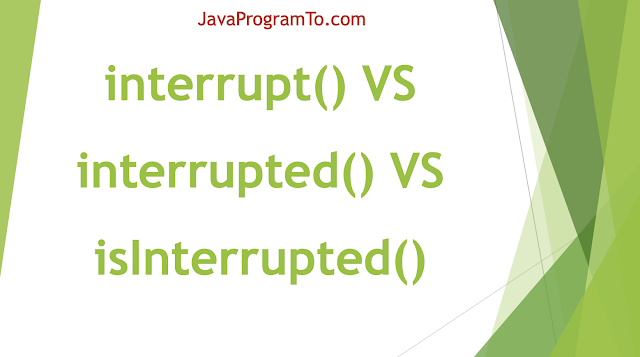1. Introduction
In this article, we will go through the thread class methods interrupt(), interrupted() and isInterrupted(). All these methods are looking for the same usage and context but they do different jobs in little differently.
Syntax:
public void interrupt()public static boolean interrupted()
public boolean isInterrupted()
This method can be used to kill the thread using interrupt() method.
2. interrupt() method
This method must be called on thread instance and this method is used interrupts the thread. When interrupt() method is called this gives the hint to JVM. When you call this method thread will not be interrupted immediately. Let us see the below example.
package com.java.w3schools.blog.java.program.to.threads.interrupt;
public class ThreadWithoutIntterupt {
public static void main(String[] args) {
Thread t = new Thread(new PrintEvenNumbers());
// starting the thread
t.start();
// calling interrupt() method.
t.interrupt();
}
}
class PrintEvenNumbers implements Runnable {
@Override
public void run() {
System.out.println("Printing even numbers till 20 :");
for (int i = 2; i <= 20; i = i + 2) {
System.out.println(i);
}
}
}
Output:
Printing even numbers till 20 :
2
4
6
8
10
12
14
16
18
20
In the above program, First created a class named PrintEvenNumbers and implements the Runnable interface. Written a logic to print even numbers in the run() method. In the main method, created a Thread and called start() method to start a thread and immediately called interrupt() method but the thread is not interrupted. It has printed all even numbers till 20.
Because invoking interrupt() method just gives a hint to JVM to interrupt but it is not mandatory. Actually, interrupt() is applied on the thread if and if only a thread is blocked by one of these methods such as wait(), join() and sleep() methods. If a thread is not having these methods then the thread will not be interrupted in middle. That means Thread will do its job till the end.
Example to interrupt() thread:
package com.java.w3schools.blog.java.program.to.threads.interrupt;
public class ThreadWithoutIntterupt {
public static void main(String[] args) {
Thread t = new Thread(new PrintEvenNumbers());
// starting the thread
t.start();
// calling interrupt() method.
t.interrupt();
}
}
class PrintEvenNumbers implements Runnable {
@Override
public void run() {
System.out.println("Printing even numbers till 20 :");
try {
Thread.sleep(1000);
} catch (InterruptedException e) {
throw new InternalError("Thraed is interrupted");
}
}
}
Output:
Printing even numbers till 20 :
Exception in thread "Thread-0" java.lang.InternalError: Thraed is interrupted
at com.java.w3schools.blog.java.program.to.threads.interrupt.PrintEvenNumbers.run(ThreadWithoutIntterupt.java:29)
at java.base/java.lang.Thread.run(Thread.java:835)
As soon as thread enters into sleep, then immediately thread will be interrupted.
Note: This method return type is void that means will not return any value about its interruption.
3. interrupted() method
the interrupted() method is used to check whether the thread is interrupted or not. But this method clears the interrupted status and returns true if the method is interrupted else false.
package com.java.w3schools.blog.java.program.to.threads.interrupt;
public class ThreadIntterupted {
public static void main(String[] args) throws InterruptedException {
Thread t = new Thread(new PrintEvenNumbers2());
// starting the thread
t.start();
// calling interrupt() method.
if (!t.interrupted()) {
t.interrupt();
}
System.out.println();
}
}
class PrintEvenNumbers2 implements Runnable {
@Override
public void run() {
try {
System.out.println("Executing thread");
Thread.sleep(1000);
} catch (InterruptedException e) {
e.printStackTrace();
}
}
}
Output:
Executing thread
java.lang.InterruptedException: sleep interrupted
at java.base/java.lang.Thread.sleep(Native Method)
at com.java.w3schools.blog.java.program.to.threads.interrupt.PrintEvenNumbers2.run(ThreadIntterupted.java:29)
at java.base/java.lang.Thread.run(Thread.java:835)
Note: If the interrupted() method is called twice on one thread then the second call always returns false because the first call clears the status.
4. isInterrupted() mthod
Tests whether this thread has been interrupted. The interrupted status of the thread is unaffected by this method. That means calling twice this method will produce the same result.
public class ThreadIntterupted {
public static void main(String[] args) throws InterruptedException {
Thread t = new Thread(new PrintEvenNumbers2());
// starting the thread
t.start();
// calling interrupt() method.
if (!t.isInterrupted()) {
t.interrupt();
}
System.out.println();
}
}
class PrintEvenNumbers2 implements Runnable {
@Override
public void run() {
try {
System.out.println("Executing thread");
Thread.sleep(1000);
} catch (InterruptedException e) {
e.printStackTrace();
}
}
}
5. Conclusion
In this article, We have seen the usage of all Thread class interrupt methods along with the examples.
interrupt(): To interrupt the thread.
interrupted(): To check if the thread is already interrupted but it clears the interrupt status.
isInterrupted(): To check if the thread is already interrupted and does not clear its status.
Reference



0 Comments